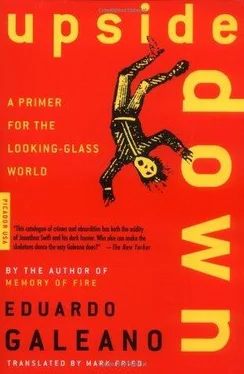
The three men worked for the greater glory of God and their own pocketbooks. It could be said that they had successful careers. But none of them escaped the persecution and martyrdom trumpeted in the Gospels for apostles of the faith. Shortly before Banco Ambrosiano went belly-up, Roberto Calvi was found hanged under a bridge in London. Four years later, Michele Sindona, then in a maximum-security prison, asked for coffee with sugar. They didn’t quite catch the order and gave him coffee with cyanide. A few months after that, an arrest warrant was issued for Archbishop Marcinkus, for fraudulent bankruptcy.
POLITICAL POWER
Sixty years ago the Argentine writer Roberto Arlt had some advice for anyone wanting to pursue a career in politics: “Proclaim: ‘I have robbed, and I aspire to robbing on a larger scale.’ Promise to sell off every last inch of Argentine soil, to sell the Congress building and turn the Palace of Justice into a tenement. In your speeches, say: ‘Stealing isn’t easy, gentlemen. You have to be a cynic, and that’s what I am. You have to be a traitor, and that’s what I am.’”
Arlt thought this would be a sure-fire formula for success, since all the scoundrels speak of is honesty and people tire of lies. A Brazilian politician, Adhemar de Barros, won over the electorate of the state of São Paulo, the richest in the country, with the slogan “ Rouba mas faz ”—“He steals but he gets things done.” In Argentina, in contrast, Arlt’s advice never caught on and today it’s still impossible to find a politician who has the courage to admit he will steal or to confess he has stolen. And none of these looters of the public purse is capable of acknowledging, “I stole for myself. I stole to give myself the good life.” If any of them had a conscience that could torment him, he would at least say: “I did it for the party, for the people, for the country.” Some politicians love their country so much they take it all home.
Roberto Arlt’s formula won’t work. No Brazilian politician has copied Adhemar de Barros’s recipe. As a general rule, what garners the most votes are the arts of theater — good acting, well-chosen masks. As another Argentine writer, José Pablo Feinmann, once put it, electoral politics tends to reward doublespeak and split personalities. Many professional politicians cultivate the schizophrenia that turns timid Clark Kent into Superman just by his removing his glasses and insipid Bruce Wayne into Batman when he puts on his bat cape.
Prices
In 1993, the tiny Brazilian Social Democratic Party didn’t have the minimum number of representatives in Congress to be eligible for the presidential elections. For a price that varied between $30,000 and $50,000, it bought a number of congressmen from other parties. One of them admitted it and, what’s more, he offered an explanation: “That’s what soccer players do when they change clubs.”
Four years later, prices had gone up in Brasilia. Two congressmen received $200,000 apiece for voting in favor of a constitutional amendment to allow President Cardoso to run for reelection.
You don’t need to be a poli-sci major to realize that political speeches usually have to be read backwards for their real meaning. There are few exceptions to the rule: politicians promise change and once they’re elected they change … their minds. Sometimes they turn around so fast they get dizzy and you get a stiff neck from watching them spin to the right. “Education and health first!” they proclaim like the captain of a ship crying, “Women and children first!” and sure enough, education and health are the first to drown. Their words praise hard work, and their deeds damn the workers. Politicians who swear, hand over heart, that national sovereignty has no price tend to be the ones who give it away for nothing. And those who proclaim they’ll round up all the crooks tend to be the ones who steal even the shoes off horses galloping by.
In mid-1996, Abdalá Bucaram won the presidency of Ecuador by calling himself the lash of the corrupt. Bucaram, a boisterous politician who thought he sang like Julio Iglesias and was actually proud of that, provoked widespread outrage and was thrown out of office after only a few months. One of the straws that broke the back of people’s patience was the party he threw for his eighteen-year-old son, Jacobito, to celebrate the first million he made performing miracles in the customs office.
In 1990, Fernando Collor became president of Brazil. In a quick and dirty election campaign made possible by television, Collor gave speech after moralistic speech attacking the “maharajahs,” or top bureaucrats, who were looting the state. Two and a half years later, up to his neck in scandal, Collor was impeached for his secret bank accounts and ostentatious displays of instant wealth. In 1993, the president of Venezuela, Carlos Andrés Pérez, was also thrown out of office and sentenced to house arrest for embezzling funds. Never in the history of Latin America has anyone been obliged to return the money he stole — neither overthrown presidents, nor the many ministers forced out by overwhelming evidence of corruption, nor the directors of public services, nor the legislators, nor the petty officials who take money under the table. No one has ever returned a cent. I’m not saying they didn’t intend to, it’s just that it never occurred to anyone to ask.
For International Relations Class
Terence Todman and James Cheek were U.S. ambassadors to Argentina in recent years. One after the other, they followed the same trajectory: for love of the tango, they came right back. As soon as their diplomatic stints ended, they returned to Buenos Aires as lobbyists.
Both of them used their influence with the Argentine government to assist private companies eager to pocket the country’s airports. Shortly afterward, a picture of Cheek with a doll in his lap was all over television and the papers. With his victorious airport campaign behind him, Cheek went to work for Barbie, the little woman who tempts us to commit the sin of plastic.
Generous Souls
In the United States, the sale of political favors is legal and can be carried on openly — no need to pretend, no risk of scandal.
Over ten thousand bribery pros work in Washington, plying their trade with members of Congress and the tenants of the White House. In an account that was certainly not exhaustive, the Center for Responsive Politics recorded $1.2 billion legally paid out in 1997 by numerous business and professional organizations, an average of $100 million a month. Leading the long list of “donors” was the American Medical Association, which is linked to the private health care business, the Chamber of Commerce, and the companies Philip Morris, General Motors, and Edison Electric Institute.
The figure, which rises year after year, does not include payments made under the table. As Johnnie Chung, a businessman who acknowledged making illegal donations, explained in 1998, “The White House is like a subway: You have to put in coins to open the gates.”

Exemplary Lives/1
In September 1994, in the Brasilia studios of Globo television, Treasury Minister Rubens Ricupero was waiting to be interviewed. While the lights and microphones were adjusted, he chatted with the journalist. Relaxed and speaking off the record, the minister admitted he only gives out economic information favorable to the government and hides figures that aren’t. “I have no scruples,” he said.
Читать дальше













